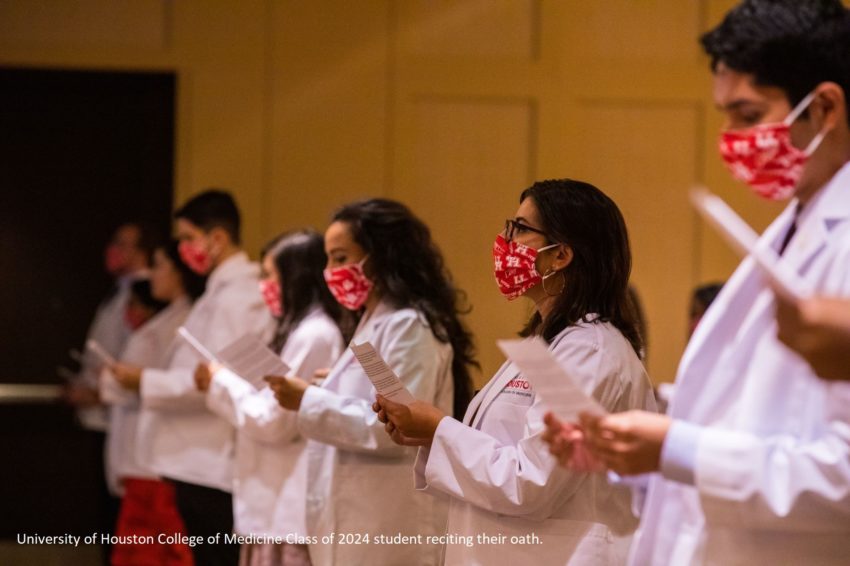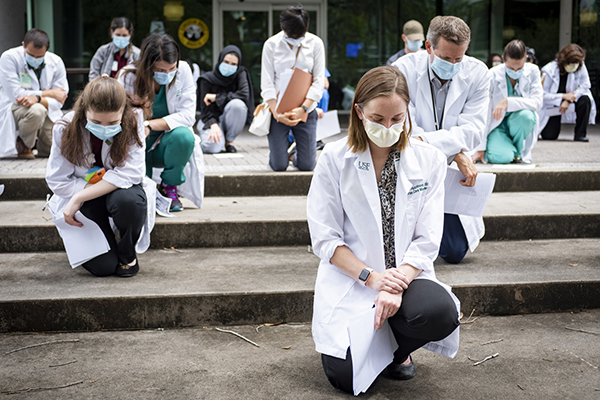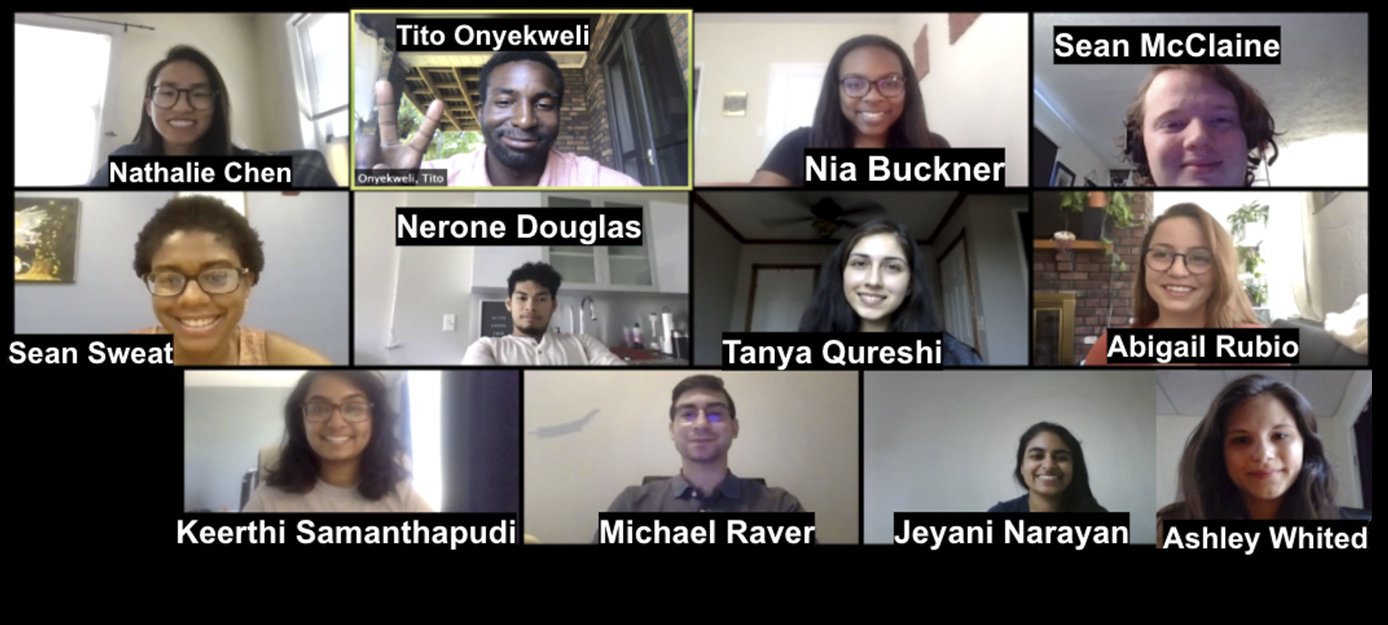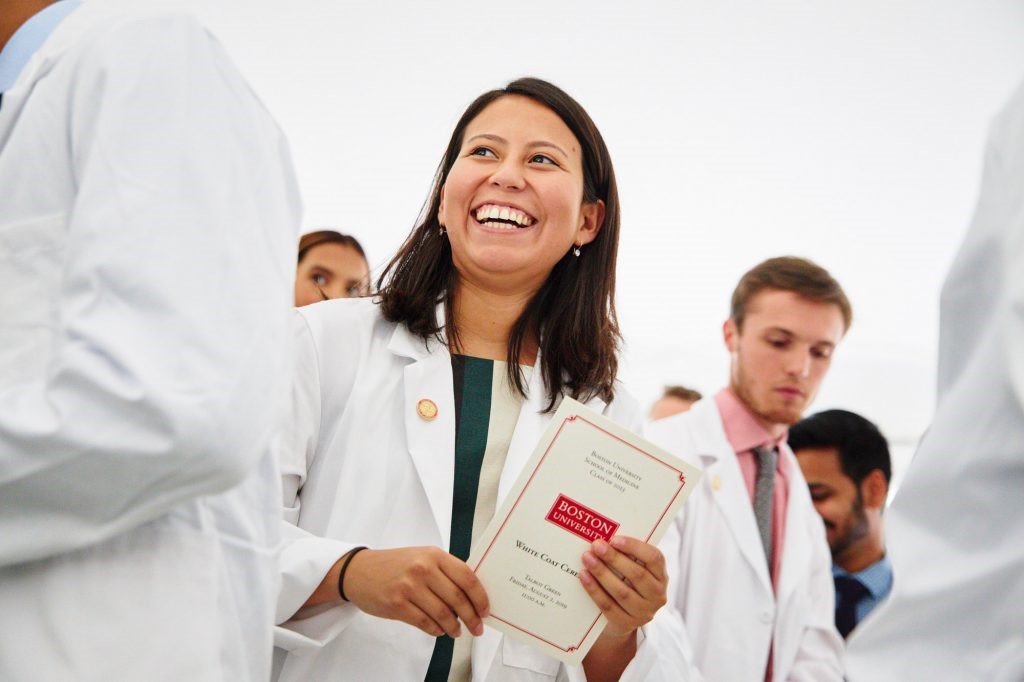
Share On Social!
In medical schools across the country, students in medical, nursing, and physician assistant programs participate in a ritual known as the white coat ceremony. This signifies the beginning of their journeys to achieve the long white lab coat, a well-recognized symbol of respect and professionalism.
During the ceremony, students receive a short white lab coat and recite a class oath or pledge, acknowledging their obligation to compassion and scientific excellence as health care providers.
Incoming students often write their own class oaths.
This year, amid a civil rights movement protesting police brutality and global health pandemic, students at two medical schools stand out for writing class oaths that acknowledge racism’s impact on public health.
These new oaths call for students to recognize and fight against racial injustices that contribute to inequities in health.
As We Enter 2021, Racial Injustices Continue to Impact Public Health
Researchers believe the socioeconomic and environmental conditions in which we live, learn, work, and play—known as social determinants of health—drive more than 80% of health outcomes.
Whether intentional or unintentional, racism has structured and continues to structure these socioeconomic and environmental conditions.
This happens through past and present policies and practices at various levels of society.
“As a structured system, racism interacts with other social institutions, shaping them and being re-shaped by them, to reinforce, justify and perpetuate a racial hierarchy,” according to researchers in the Annual Review of Public Health. “Structural racism exists within, and is reinforced and supported by multiple societal systems, including the housing, labor and credit markets, and the education, criminal justice, economic and healthcare systems. Accordingly, racism is adaptive over time, maintaining its pervasive adverse effects through multiple mechanisms that arise to replace forms that have been diminished.”
The American Public Health Association (APHA) finds racism to be a barrier to health equity and has named racism a driving force of how social determinants of health are distributed.

In fact, many researchers, agencies, and professional associations across the country have acknowledged that racism continues to threaten public health.
For example:
- In a 2018 policy agenda, the National Partnership for Women and Families (NPWF) stated the systemic racial bias women of color face throughout their lives, from unsafe or unstable housing during childhood and diminished educational options, to unequal pay and employment opportunities, to lack of access to insurance coverage, affordable health care, and reproductive health services, has a profound impact on a woman’s health throughout her lifetime.
- In a 2018 position paper, the American College of Physicians (ACP) reported that years of racial and ethnic discrimination have caused unavoidable and unfair inequalities in power, resources, and opportunities across racial or ethnic groups and have resulted in a legacy of disadvantaged groups more likely to reside in neighborhoods that lack access to nutritious food, quality housing, good jobs, or properly funded schools, all of which can contribute to poorer health outcomes.
- In a 2020 position paper, the ACP stated, “the demonstrated association between discriminatory law enforcement practices and violence and personal and community health necessitates treating these issues as public health issues worthy of a public policy intervention,” and offers recommendations on beginning to address and mitigate racism and discrimination in law enforcement.
- In June 2020, the American Medical Association (AMA) pledged to confront systemic racism and police brutality and released a statement recognizing that systemic, structural, institutional, and interpersonal racism is an urgent threat to public health and the advancement of health equity.
- In November 2020, the AMA expanded on their June 2020 pledge and detailed a plan to mitigate the effects of racism including: acknowledging that the primary drivers of racial health inequity are systemic and structural racism; acknowledging that racism and unconscious bias within medical research and health care delivery have caused and continue to cause harm to marginalized communities and society as a whole; and encouraging governmental agencies and nongovernmental organizations to increase funding for research into the epidemiology of risks and damages related to racism and how to prevent or repair them.
- The Surgeon General of California found that racism is a risk factor for toxic stress, a root cause of some of the most harmful, persistent, and expensive health challenges facing our nation.
“Racism is a system of structuring opportunity and assigning value based on the social interpretation of how one looks (which is what we call “race”), that unfairly disadvantages some individuals and communities, unfairly advantages other individuals and communities, and saps the strength of the whole society through the waste of human resources,” said Dr. Camara Phyllis Jones, APHA past president.
A bill to establish a National Center on Antiracism and Health was even introduced in the House of Representatives in September 2020. The bill also called for a law enforcement violence prevention program within the Centers for Disease Control and Prevention (CDC).
As medical students begin their training, white coat ceremonies are one platform they can publicly commit to acknowledging and addressing racial injustices.
Medical Students Start their Training by Acknowledging Racial Injustices
Students at the Icahn School of Medicine at Mount Sinai and at the University of Pittsburgh School of Medicine are some of the first to address police brutality and racial injustices in their class oaths during their white coat ceremonies.
First-year medical student Sean Sweat “didn’t want to tiptoe around” issues of race, and worked with her fellow classmates over Zoom to write their new oath at the University of Pittsburgh School of Medicine, according to Sara Boden with NPR.

For example, both began their class oaths by addressing civil rights:
- “As the entering class of 2020, we start our medical journey amidst the COVID-19 pandemic and a national civil rights movement reinvigorated by the killings of Breonna Taylor, George Floyd, and Ahmaud Arbery,” the University of Pittsburgh School of Medicine Class of 2024 Oath
- “We begin out medical careers in the midst of the COVID-19 pandemic and its striking health inequities, as Black Lives Matter and protests against police brutality sweep the country and millions of people and unemployed and facing eviction,” the Icahn School of Medicine at Mount Sinai Class of 2024 Student Oath
“Patients entrust us to take care of their health,” Sweat said according to Boden. “In my opinion we’re more than just physicians. We’re leaders in this society. With that comes a responsibility.”
Here are some additional statements from the University of Pittsburgh School of Medicine Class of 2024 Oath:
- “This oath is the first step in our enduring commitment to repairing the injustices against those historically ignored and abused in medicine: Black patients, Indigenous patients, Patients of Color and all marginalized populations who have received substandard care as a result of their identify and limited resources
- “I will educate myself on social determinants of health in order to use my voice as a physician to advocate for a more equitable health care system from the local to the global level.”
Here are some additional statements from the Icahn School of Medicine at Mount Sinai Class of 2024 Student Oath:
- “[Students pledge to] appreciate the impact that socioeconomic, political, and other structural forces have on the health of our patients and communities and apply that knowledge in their service and in the service of public health.”
- “[Students pledge to] serve as agents for social justice by fighting against healthcare inequity, racism, police brutality, gun violence, climate change, and other injustices. We view this activism as integral to the profession of physicians.”
Medical students across the country are taking other actions to
For example, in June, University of South Florida Health Morsani College of Medicine students came together and decided to form a chapter of the national White Coats 4 Black Lives.
Watch a video of what the white coat means to Class of 2024 students at the Icahn School of Medicine at Mount Sinai.
Consider what personal and professional platforms you have to speak up against racial injustices.
You can your city to declare racism a public health crisis by downloading the free Salud America! “Get Your City to Declare Racism a Public Health Crisis Action Pack“!
The Action Pack will help you gain feedback from local social justice groups and advocates of color. It will also help you start a conversation with city leaders for a resolution to declare racism a public health issue along with a commitment to take action to change policies and practices. It will also help build local support.

“As a professional, I have a voice and a platform to create change,” said Bruna Pino, first generation Hispanic immigrant and medical student at Boston University School of Medicine, in a statement about what her white coat means to her. “My hope is to have made a difference advocating for the lives of all my patients no matter their background and to use my own experiences of immigrating and adapting to a new culture to serve as a cultural liaison for them.”
By The Numbers
3
Big Excuses
people use to justify discriminatory behavior



